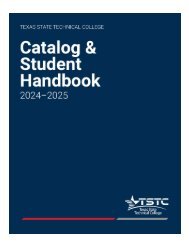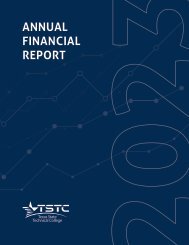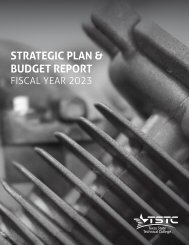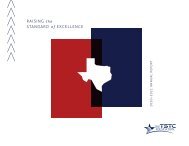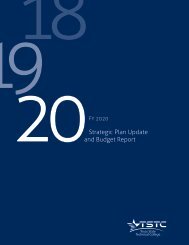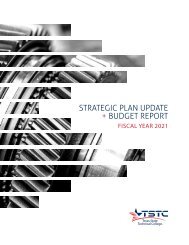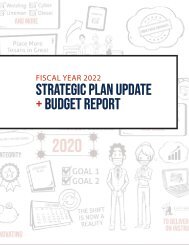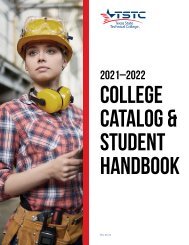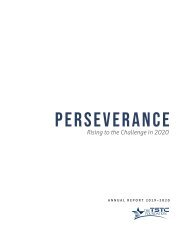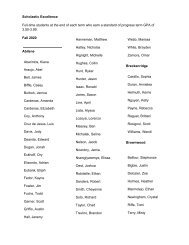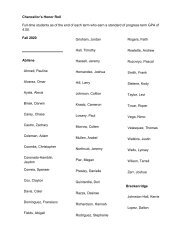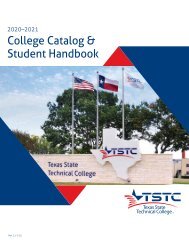Student Handbook and Catalog 2021-22 V2
Create successful ePaper yourself
Turn your PDF publications into a flip-book with our unique Google optimized e-Paper software.
Course Descriptions | 181<br />
based on experimental data <strong>and</strong> geologic data gathered from field<br />
observations. Laboratory activities will cover methods used to<br />
collect <strong>and</strong> analyze earth science data.<br />
GOVT<br />
GOVT 2305 (3-0-3) Origin <strong>and</strong> development of the U.S. Constitution,<br />
structure <strong>and</strong> powers of the national government including the<br />
legislative, executive, <strong>and</strong> judicial branches, federalism, political<br />
participation, the national election process, public policy, civil<br />
liberties <strong>and</strong> civil rights. Prerequisite: TSI Complete Reading<br />
GOVT 2306 (3-0-3) Origin <strong>and</strong> development of the Texas<br />
constitution, structure <strong>and</strong> powers of state <strong>and</strong> local government,<br />
federalism <strong>and</strong> inter-governmental relations, political participation,<br />
the election process, public policy, <strong>and</strong> the political culture of Texas.<br />
Prerequisite: TSI Complete Reading<br />
HIST<br />
HIST 1301 (3-0-3) A survey of the social, political, economic,<br />
cultural, <strong>and</strong> intellectual history of the United States from the<br />
pre-Columbian era to the Civil War/Reconstruction period. United<br />
States History I includes the study of pre-Columbian, colonial,<br />
revolutionary, early national, slavery <strong>and</strong> sectionalism, <strong>and</strong> the<br />
Civil War/Reconstruction eras. Themes that may be addressed in<br />
United States History I include: American settlement <strong>and</strong> diversity,<br />
American culture, religion, civil <strong>and</strong> human rights, technological<br />
change, economic change, immigration <strong>and</strong> migration, <strong>and</strong> creation<br />
of the federal government. Prerequisite: TSI Complete Reading<br />
HIST 1302 (3-0-3) A survey of the social, political, economic,<br />
cultural, <strong>and</strong> intellectual history of the United States from the<br />
Civil War/Reconstruction era to the present. United States History<br />
II examines industrialization, immigration, world wars, the Great<br />
Depression, Cold War <strong>and</strong> post-Cold War eras. Themes that<br />
may be addressed in United States History II include: American<br />
culture, religion, civil <strong>and</strong> human rights, technological change,<br />
economic change, immigration <strong>and</strong> migration, urbanization <strong>and</strong><br />
suburbanization, the expansion of the federal government, <strong>and</strong> the<br />
study of U.S. foreign policy. Prerequisite: TSI Complete Reading<br />
HIST 2312 (3-0-3) A survey of the social, political, economic,<br />
cultural, religious, <strong>and</strong> intellectual history of Europe <strong>and</strong> the<br />
Mediterranean world from the 17th century to the modern era.<br />
Themes that should be addressed in Western Civilization II include<br />
absolutism <strong>and</strong> constitutionalism, growth of nation states, the<br />
Enlightenment, revolutions, classical liberalism, industrialization,<br />
imperialism, global conflict, the Cold War, <strong>and</strong> globalism.<br />
HIST 2321 (3-0-3) A survey of the social, political, economic,<br />
cultural, religious, <strong>and</strong> intellectual history of the world from the<br />
emergence of human cultures through the 15th century. The course<br />
examines major cultural regions of the world in Africa, the Americas,<br />
Asia, Europe, <strong>and</strong> Oceania <strong>and</strong> their global interactions over time.<br />
Themes include the emergence of early societies, the rise of<br />
civilizations, the development of political <strong>and</strong> legal systems, religion<br />
<strong>and</strong> philosophy, economic systems <strong>and</strong> trans-regional networks of<br />
exchange. The course emphasizes the development, interaction <strong>and</strong><br />
impact of global exchange.<br />
HORT<br />
HORT 1401 (3-2-4) Structure, growth, <strong>and</strong> development of<br />
horticultural plants. Examination of environmental effects, basic<br />
principles of reproduction, production methods ranging from<br />
outdoor to controlled climates, nutrition, <strong>and</strong> pest management.<br />
Laboratory activities will reinforce the structure, growth, <strong>and</strong><br />
development of horticultural plants.<br />
HUMA<br />
HUMA 1301 (3-0-3) This st<strong>and</strong>-alone course is an interdisciplinary<br />
survey of cultures focusing on the philosophical <strong>and</strong> aesthetic<br />
factors in human values with an emphasis on the historical<br />
development of the individual <strong>and</strong> society <strong>and</strong> the need to create.<br />
HUMA 2319 (3-0-3) This interdisciplinary survey examines the<br />
diverse cultural, artistic, economic, historical, political, <strong>and</strong> social<br />
aspects of American minority communities. Topics may include race/<br />
ethnicity, gender, socioeconomic class, sexual orientation, national<br />
origin, age, disability, <strong>and</strong> religion.<br />
HUMA 2323 (3-0-3) This course is a general study of diverse world<br />
cultures. Topics include cultural practices, social structures, religions,<br />
arts, <strong>and</strong> languages.<br />
MATH<br />
MATH 1314 (3-0-3) In-depth study <strong>and</strong> applications of polynomial,<br />
rational, radical, exponential <strong>and</strong> logarithmic functions, <strong>and</strong> systems<br />
of equations using matrices. Additional topics such as sequences,<br />
series, probability, <strong>and</strong> conics may be included.<br />
MATH 1316 (3-0-3) In-depth study <strong>and</strong> applications of trigonometry<br />
including definitions, identities, inverse functions, solutions of<br />
equations, graphing, <strong>and</strong> solving triangles. Additional topics such<br />
as vectors, polar coordinates <strong>and</strong> parametric equations may be<br />
included. Prerequisite: TSI complete Math<br />
MATH 1325 (3-0-3) This course is the basic study of limits <strong>and</strong><br />
continuity, differentiation, optimization <strong>and</strong> graphing, <strong>and</strong><br />
integration of elementary functions, with emphasis on applications<br />
in business, economics, <strong>and</strong> social sciences. This course is not a<br />
substitute for MATH 2413, Calculus I. Prerequisite: MATH 1324<br />
MATH 1332 (3-0-3) Intended for Non STEM (Science, Technology,<br />
Engineering, <strong>and</strong> Mathematics) majors. Topics include introductory<br />
treatments of sets <strong>and</strong> logic, financial mathematics, probability <strong>and</strong><br />
statistics with appropriate applications. Number sense, proportional<br />
reasoning, estimation, technology, <strong>and</strong> communication should be<br />
embedded throughout the course. Additional topics may be covered.<br />
MATH 1342 (3-0-3) Collection, analysis, presentation <strong>and</strong><br />
interpretation of data, <strong>and</strong> probability. Analysis includes descriptive<br />
statistics, correlation <strong>and</strong> regression, confidence intervals <strong>and</strong><br />
hypothesis testing. Use of appropriate technology is recommended.<br />
MATH 1350 (3-0-3) This course is intended to build or reinforce<br />
a foundation in fundamental mathematics concepts <strong>and</strong> skills.<br />
It includes the conceptual development of the following: sets,<br />
Texas State Technical College<br />
tstc.edu



